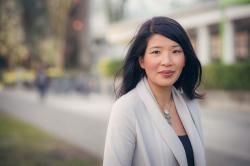In her op-ed in CBC News and interview with Global TV, Professor Carol Liao reflects on the need for collective commitment to build anti-racist communities.
 Professor Carol Liao
Professor Carol Liao
Over the past few years, Professor Carol Liao has delivered several public talks and private workshops on the topic of gender and race in governance, which she has conducted with her industry partner, Shona McGlashan, Vice President of Governance at Vancity.
As protests erupted around the world after the murder of George Floyd by police, here in Canada along with ongoing anti-Black and anti-Indigenous racism and violence, there has been a rise of anti-Asian hate crimes fueled by the COVID-19 pandemic. On April 24th following the videoed racist attack on an elderly Asian man in Vancouver, Professor Liao was interviewed by Gloria Macarenko with CBC on the Coast discussing both the overt and systemic racism that subsists in the city. She then published an op-ed in CBC News on May 16th identifying how hate crimes should not be regarded as isolated incidents, but part of a longer history of racism needing to be addressed. She points out how public ambivalence plays a significant role in perpetuating race-based trauma and calls for concerted efforts in “education and awareness, interventions, and activism.”
On June 7th Professor Liao gave a one-on-one television interview with Dawna Friesen on the Global TV News special, Coronavirus: The New Frontier, where she unpacks anti-Asian racism and other racisms in Canada, discussing issues ranging from hate crimes to unconscious bias. She reflects on how the increased anti-Asian racism should be a reminder to Asian Canadians that “we have often benefited from a system that is rooted in anti-Blackness and the model minority position is only used to bolster the status quo, until it is taken away.”
She notes to Friesen: “There’s a false sense of Canadian exceptionalism that forgets our very racist history…. It is beholden on all of us to recognize where we are situated in all of this. There needs to be some introspection on the power dynamics within each institution. Hopefully now, we can spend less time discussing whether racism is real and exists within our institutions and focus more on what can be done about it.”
Professor Liao is also the Director of the Centre for Business Law at Allard Law and the UBC Sauder Distinguished Scholar at the Dhillon Centre for Business Ethics, working with other faculty, students and practitioners to facilitate discussions on cutting-edge issues at the intersection of law and business. Professor Liao has sought and led networks to help overcome equity gaps in her field, including as a steering committee member of the Themis International Female Business Scholars Network, an intergenerational and inclusive network of over 200 female gender-identifying business scholars from an array of scholarly fields including economics, sociology, political studies, Earth sciences, and more. Her chapter, “Power and the Gender Imperative in Corporate Law” in the edited collection, Creating Corporate Sustainability: Gender as an Agent for Change (Cambridge University Press), speaks to how gendered predispositions are imbued in norms that dominate corporate law, and through unconscious biases that subvert the ability of women and people of colour to attain meaningful positions of power that instigate change. She is a frequent presenter on issues of gender, race and diversity in corporate law, and delivered the keynote address on power and intersectionality in the legal profession at the annual Women in Law Dinner hosted by the Allard Women’s Caucus on March 5, 2020.
On July 8th, Professor Liao will be a panelist for an upcoming event hosted by the UBC Equity and Inclusion Office on anti-Asian racism.


